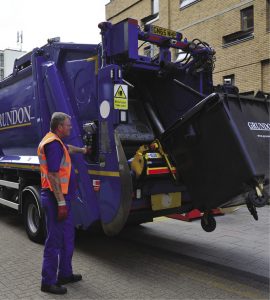COSTS OF COLLECTION
In previous years, the cost of collection and disposal has been ranked as third most important factor when making a waste management decision, however in 2020, this dropped to fifth place. We asked the panel, why is this? Is it due to increased budgets, or are there other factors, for instance internal pressures either from management or the workforce to be more sustainable?
It was suggested that the reason that cost has dropped down the agenda is that FMs would prioritise high quality service delivery that ensures they meet compliance, and will pay more for a good and compliant service. The panel also agreed that service delivery is seen as part of the “value you get from your provider, with the reassurance that this will keep you compliant being ahead over cost and collection.
Another interesting point was that FM is slightly different from other sectors, in that in some sectors customers just want their bins emptied, but FM is unique in that it looks beyond that to environment issues. There is transparency on how waste is treated and this is shared back to the workforce.
It was also suggested that there is more value placed on recycling rates now due to corporate targets. One FM chose their service provider when they agreed to “help us with the reduce piece of the three R’s which sit at the top of the waste hierarchy (Reduce, Reuse, Recycle). This was when we knew they were committed, as it’s actually counter intuitive to them to reduce the amount of actual waste for collection.”
Is there an expectation within your organisation that a good waste management service…
|
2020 |
||
|
1 |
will deliver improved environmental credentials |
56.87% |
|
2 |
will save you money |
23.22% |
|
3 |
will cost you more money |
11.37% |
|
4 |
will earn you rebates on reprocessing and recycling |
4.27% |
|
5 |
won’t make a difference |
4.27% |
It was also agreed that FMs are customer facing, whether internal or external so don’t necessarily look to pay the highest cost but are experienced enough to know the lowest cost doesn’t mean you’re getting the best from your supplier.
Commented a panellist: “If I’m in a board meeting and say the recycling has gone up I need to prove how that has been achieved. I can only do that by getting information from a supplier who is partnering with us and you can do that only if you have worked with the right supplier. They may not be the cheapest but the best and we’ll pay for that level of engagement.”
ENVIRONMENTAL REPORTING
In this year’s survey it emerged that nearly 60 per cent of those surveyed were required to produce regular environmental reports and digging deeper into that when we asked about frequency – there was at least an annual duty. Respondents also told us that monthly and quarterly reports from their waste management provider was usually required for reports. Interestingly, when we also asked about how waste management reporting can be used in a positive way to proactively promote waste management with CSR and good news stories, only about 40 per cent were utilising the data.
If you are required to produce environmental reports, how often are you required to do so?
|
N/A |
40.71% |
|
Annually |
22.12% |
|
Monthly |
19.47% |
|
Quarterly |
11.06% |
|
Every six months |
3.98% |
|
Weekly |
2.65% |
 Explained Foxlee-Brown: “We’re aiming to promote our internal sustainability credentials by producing an engagement tool with our staff, that explores how we use energy, how we use water, our recycling rates etc., and we’ve worked with a partner called Greenredeem who have an engagement platform which can be used to inform our stakeholders how sites are performing. This process has thrown up a lot of questions on how we better engage and educate our employees and how we in turn can translate that to our customers.”
Explained Foxlee-Brown: “We’re aiming to promote our internal sustainability credentials by producing an engagement tool with our staff, that explores how we use energy, how we use water, our recycling rates etc., and we’ve worked with a partner called Greenredeem who have an engagement platform which can be used to inform our stakeholders how sites are performing. This process has thrown up a lot of questions on how we better engage and educate our employees and how we in turn can translate that to our customers.”
When it comes to promoting sustainability however, we asked the panel, has waste and recycling moved right down the agenda due to wellbeing and infection control being so central?
The consensus from our panel was very positive, that the lockdown has enabled them to take a breath to reappraise sustainability strategies, with the conclusion being that recycling and reuse as a proportion of overall waste is still a very valid message to communicate to their teams. Said one participant: “One of the nudges we’ll use when we go back is to have pictures of little kids rather than seagulls next to our recycling bins.”
And while the CSR reports for this year may all be impacted by the pandemic, it was agreed that, with many staff still working remotely, most FMs are not going to be able to show continual improvement in recycling rates, but it’s still an important part of their remit.
Sara Bean, Editor FMJ
Anthony Foxlee-Brown, Head of Marketing and Communications, Grundon Waste Management
Owen George, Strategic Development Manager, Grundon Waste Management
Ian Wade, Head of UK Estates, British Medical Association
Charles Siddons, Head of FM Operations, NHS Property Services Ltd
Ross Jen, Facilities Team Leader, Campden BRI Group
David Bauld, Group Facilities Manager, Paradigm Housing Group
Jan Portch, Office Manager, Landsec’s London-based Head Office
Brett Parker, Head of Property, Gail’s Bakery
Alan Hutchinson, Facilities Director, Howard Kennedy LLP
Vicky Thorp, Head of Facilities Management, CLSH Management





